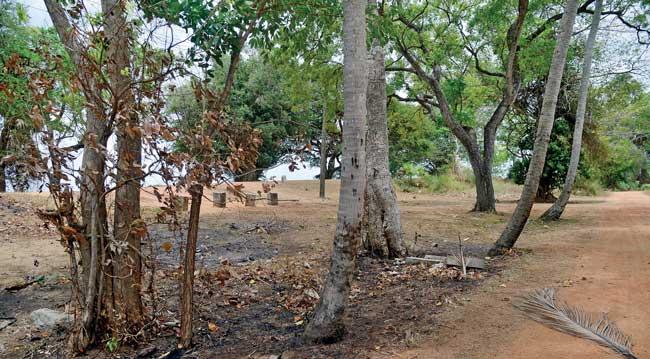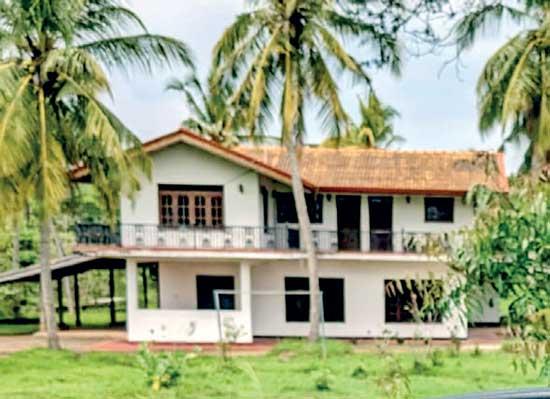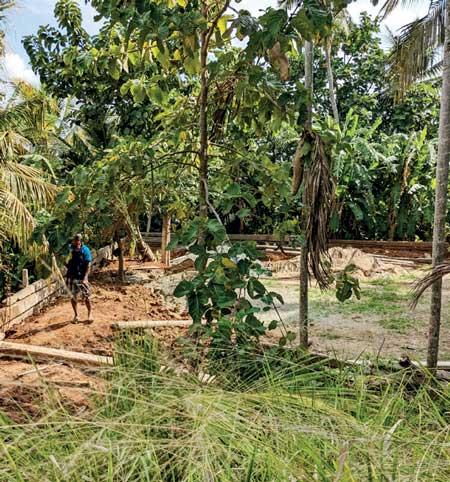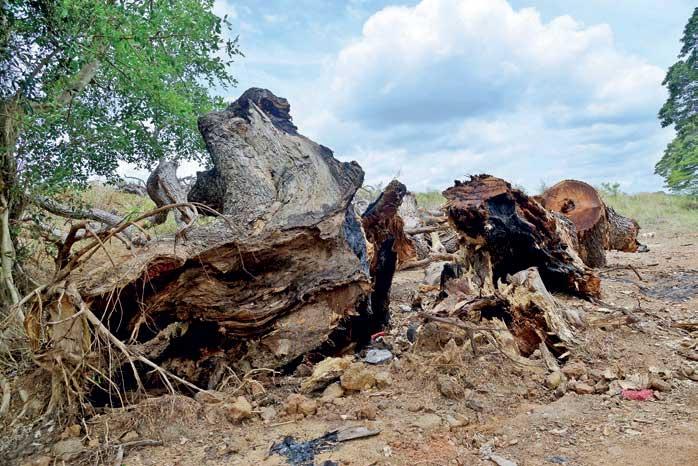Destructive activities by bigwigs threaten Tissa Wewa

Trees felled at the reserve of Tissa Wewa
pics by samantha perera

A house alleged to have been built by former Deputy Minister of IrrigationW.P.B. Ekanayake near Tissa Wewa

A land situated in the reseve being reclaimed

Trees burnt down near Tissa Wewa
It is not possible to turn a paddy field into a bare land that easily. Approval from the Department of Agrarian Services is necessary for such a purpose along with permission from various other government institutions. To reclaim a paddy land there has to be a fulfilling of a legal right to it. Reclaiming of land occurs when a request is made to the government claiming there is no other land available for the construction of a house”
– Ajith Munasinghe Former Senior Surveyor and Court Commissioner
I didn’t build a house near the reserve. The house was made in 1968. At that time the water level of Tissa Wewa was quite low. Due to the construction activities in sacred land areas the water level in the tank was subject to changes. I didn’t know whether these lands belonged to the reserve”
-W.P.B. Ekanayake
Former Deputy Minister of Irrigation
No unauthorised reclamation has ever occurred here. So far, these lands have been excluded from the sacred city plan, and steps have been taken to provide permits. This is a land I purchased and I had to reclaim it; which I have done”
– Keerthi Gamage
A Former Land Commissioner
“Some of these present issues are related to past political decisions”-Ekanayake
When this newspaper inquired from former Deputy Minister of Irrigation W.P.B Ekanayake whether he constructed a house near Bank of Tissa Wewa near the reserve area and whether the construction gets inundated during floods he responded by stating, “I didn’t build a house near the reserve. The house was made in 1968. At that time the water level of Tissa Wewa was quite low. Due to the construction activities in sacred land areas the water level in the tank was subject to changes. I didn’t know whether these lands belonged to the reserve. Some of these present issues are related to the political decisions taken in the past”.
Surveyor Ajith Munasinghe when contacted said that the houses of former Minister Ekanayake and his son were situated in the tank reserve area. There is a deed for the land behind their houses and this land doesn’t belong to the tank reserve. Munasinghe however added that the two houses have been constructed inside the tank reserve. He added that there was no deed to the land areas in the tank reserve where the two houses are standing now. Munasinghe added that the spill level of tank has remained unchanged since then.
 Tissa Wewa in Anuradhapura is currently at risk of being destroyed. It is disheartening to know that former government officials and politicians are behind this destruction. The water from this tank has been used for the purpose of drinking since ancient times. It is said that this water was not used for bathing. Currently, the tank has a capacity of approximately 3500 acre-feet; making it crucial to preserve this reservoir as it provides essential water to a significant number of people.
Tissa Wewa in Anuradhapura is currently at risk of being destroyed. It is disheartening to know that former government officials and politicians are behind this destruction. The water from this tank has been used for the purpose of drinking since ancient times. It is said that this water was not used for bathing. Currently, the tank has a capacity of approximately 3500 acre-feet; making it crucial to preserve this reservoir as it provides essential water to a significant number of people.
Currently, there is a significant risk of the destruction of Tissa Wewa and its associated reserve area. An area four times the height of the tank bund belongs to the reserve. However, recently, some individuals set fire to the large rain trees in the reserve area below the tank bund. There are claims that the trees were removed to ensure that the hotels constructed nearby have a better view of the area. When this scribe visited the site, it was obvious that fires had been ignited inside the hollows of rain trees. Subsequently, those responsible for these destructive activities arranged for the cutting and removal of the trees with claims being made that they were posing a danger to passersby. As a result, approximately five enormous rain trees have been burned and destroyed. As a result of the tree cutting exercise the hotels nearby can now offer a view of the stupa (Buddhist statue) at a distance. These individuals seek to remove trees in the reserve area in order to make the existence of the hotels more prominent. It has also been reported that the trees were cut and set on fire to ease traffic obstructions on the road running beneath the tank bund.
Commenting on this issue, former Senior Surveyor and Court Commissioner Ajith Munasinghe said that a road leading to the hotels has been constructed through the lower reserve area of the tank bund. This is despite the availability of alternative access routes to those hotels. Munasinghe emphasised that this poses a risk to the tank bund. Furthermore, a famous hotel was built in the reserve area of the tank bund, leading to a court order for its demolition following a lawsuit. Munasinghe underscored that despite the court order, certain government officials and politicians are attempting to damage the tank reserve.
W.P.B. Ekanayake, a former Deputy Minister of Irrigation, has constructed a house in the reserve area of the spillway level of Tissa Wewa. There is no deed for the land on which the house is built. However, the high-ranking officials of the Irrigation Department of Sri Lanka at that time took no action to prevent this construction. When Tissa Wewa spills over, the minister’s house becomes inundated; requiring residents to commute by boat. Additionally, a former Divisional Secretary has built a house in the Tissa Wewa Reserve and subsequently sold it. Munasinghe said that the said Divisional Secretary had later joined the health sector.
Illegal reclamation activities
During the ‘Gam Udawa’ programme in Anuradhapura, buildings were constructed relentlessly within the Tissa Wewa reserve. Munasinghe also said that the Tissa Wewa Reserve has been exposed to the risk of destruction for the past 30 years. The most recent development is that Keerthi Gamage, a former land commissioner, has plans to reclaim a sacred land around Tissa Wewa. Specifically, the former land commissioner plans to reclaim a paddy land to which a deed is yet to be obtained. The lands in that area belong to the sacred land zone and currently only the land for vegetable cultivation (goda idam) has been removed from the zone. The paddy lands still fall under the sacred land zone, representing ancient fields cultivated by the Tamil people. However, after the Tamil people left in 1983, these paddy lands were subsequently acquired by the sacred city. In 1956, under the sacred city concept, Bandaranaike acquired these lands; compensating the owners in stages. Since 2001 there has been ongoing land acquisition near Tissa Wewa with Munasinghe noting that these lands are still being acquired after a process of paying compensation.
“In addition, it is not possible to turn a paddy field into a bare land that easily. Approval from the Department of Agrarian Services is necessary for such a purpose along with permission from various other government institutions. To reclaim a paddy land there has to be a fulfilling of a legal right to it. Reclaiming of land occurs when a request is made to the government claiming there is no other land available for the construction of a house. Subsequently, the government then allows reclaiming 10 perches from the paddy land. However, the former Land Commissioner doesn’t need to do so,” he said. Munasinghe added that the former Land Commissioner has been given ownership of a 60-perch land by the government after the taxpaying process was completed.
Thus, when free land is provided by the government in this manner there is no permission to reconvert a paddy land owned by the government into a bare land. “If the former Land Commissioner purchased the paddy land, there ought to be a legal deed. However, the former Land Commissioner doesn’t possess any legal deed for the respective paddy land. Therefore, he has no right to reclaim the land maintaining that he bought the paddy land for money. Before reclaiming the paddy land, as his very own, the former Land Commissioner didn’t obtain permission from any government institution for this purpose. As a result of reclaiming this land, the nearby irrigation canal has also been blocked,” he said. Munasinghe added that there is also a problem regarding water drainage during the rainy season due to the lower elevation of the surrounding lands.
Anuradhapura city can also be affected during the rainy season due to such illegal reclamation activities. Munasinghe said that the Mihindupura Village in Anuradhapura may face the threat of floods due to the filling of soil in Harischandra Park; which in a way blocks the Malwatu Oya flood area. “Additionally, even though the land for vegetable cultivation- belonging to sacred city- has been released so far, deeds might not have been provided for all the lands,” said Munasinghe. Munasinghe added that there is unreported unauthorised reclamation activity happening around Tissa Wewa, and the Irrigation Department should investigate them.
Lands excluded from the sacred city plan
This newspaper also inquired from former Land Commissioner Gamage regarding this issue. He said, “I purchased this land 12 years ago. There are no licences or freehold deeds for this land. A request has been submitted to obtain permits for the land. No unauthorised reclamation has ever occurred here. So far, these lands have been excluded from the sacred city plan, and steps have been taken to provide permits. This is a land I purchased and I had to reclaim it; which I have done. It has now been reclaimed and the process has ceased. The Divisional Secretary advised to develop the land legally after obtaining permission from government institutions. I am currently engaged in seeking legal permission from the respective institutions. The Minister of Lands has also requested the issuance of a legal licence for this land,” said Gamage.
We also asked R.P.M Senaratne, Divisional Secretary of Nuwaragam Palatha Central-the area to which the Tissa Wewa belongs, whether there have been reports of unauthorised reclamation and destruction of the tank. He said that he was aware of the unauthorised activities around Tissa Wewa. “Such acts are taking place in various places. I have addressed all the reports and taken necessary actions. The Agrarian Service Department needs to act on the reclamation of paddy land. A former land commissioner had also reclaimed a paddy land without obtaining permission. We halted the process. Reclaiming a paddy land in areas under a sacred land zone- where people are allowed to live- is permissible. However, legal permission must be obtained for this activity. As there was no such permission obtained, we advised the individual to obtain permission from the relevant institutions. Until then, the process of the land, which was being reclaimed, was temporarily halted. In addition, when unauthorised activities occur in reserve areas, we enforce the law in areas where intervention is possible and we forward other matters to the relevant institutions,” Senaratne added.
This newspaper then inquired from Jayantha de Silva, Director Anuradhapura office of the Irrigation Department, regarding this issue. “I have recently assumed the role of Director in the Irrigation Department. If reclamation activities or unauthorised activities have taken place without our permission, appropriate actions should have been taken. Maybe the former land commissioner has not obtained permission for such activity. I will investigate into this matter. In any case, we do not allow reclamation in the reserve area,” De Silva affirmed.
This newspaper also contacted the Physical Planning Department regarding this matter. Thilak Ratnayake, Director of Design Planning at the Physical Planning Department, said that no individual is ever granted permission to reclaim a land. “Our role is to grant permission for the development of a sacred land. The former land commissioner has not been authorised to reclaim a paddy land,” he added.
This newspaper then attempted to contact the Municipal Commissioner of Anuradhapura Municipal Council Ruwan Wijesinghe. Though attempts were made to contact him through both his office phone and mobile phone there was no response. The Anuradhapura office of the Urban Development Authority was also contacted to gather information on these matters, but there was no response from those institutes as well.
This newspaper then attempted to speak with C. Ekanayake, Deputy Commissioner of the Anuradhapura office of the Department of Agrarian Services, to discuss the possibility of reclaiming a paddy land purchased for money sans legal rights, but our attempts made to reach him proved futile. It was conveyed to this newspaper that Ekanayake is currently in Colombo and only visits Anuradhapura for work one day during the week.






